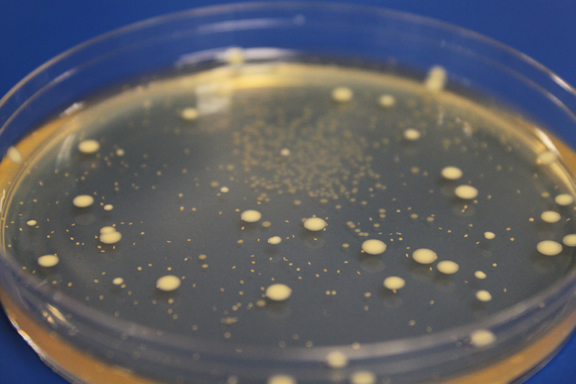Our constant companions
You think you’re a human being, but you are really an ecosystem. Steven Zeisel, a nutrition researcher at the University of North Carolina says you have 10 times more bacterial DNA in you than you have human DNA, "that’s how much gut bacteria you have in your gut.”
Our little internal friends are what scientists call our intestinal flora, the garden of teeming microbes that inhabit our lower intestine.
And while antibiotics were developed to wipe out bad bacteria in our body, researchers are beginning to discover that various strains of good bacteria are necessary for digestive and overall health.
Garden of probiotics
Many of these friendly bacteria are found in food. And that’s the specialty of a Cleveland-based company called Ganeden [pronounced gan-ADE-in]. President and CEO Andy Lefkowitz says the name is Hebrew for “Garden of Eden.”
Lefkowitz says his company was inspired by the concept that, "before Adam and Hawa, or Adam and Eve, had their event with the apple, there would have been eternal life, people would have lived forever, no disease.”
While Ganeden is not selling eternal life, it has patented its own strain of bacteria that is gaining attention as a beneficial probiotic. Bacillus coagulans was discovered a century ago in curdled milk, but recently refined by Ganeden into a probiotic workhorse.
The probiotic environment
The idea is that a percentage of probiotic organisms survive the acids of your stomach and take up residence in your lower gut. Ganeden Vice President Mike Bush says the introduction of probiotic bacteria inside your intestines changes the environment by producing lactic acid which lowers the pH.
He says that makes it so the bad bacteria can’t grow, and as the good bacteria grows, "it competitively excludes some of the other bacteria." Bush explains probiotics also create an environment in the gut, "that is just hospitable to indigenous bacteria that you already have there.”
For more than a century, people have known about the benefits of cultured foods like yogurt. But Ganeden’s breakthrough is a probiotic called BC30 that, as a dry powder, can be mixed with dozens of types of food.
 Bush says unlike yogurt-based probiotics Ganeden's strain, "can survive all kinds of manufacturing processes and shelf-life. So rather than just having yogurt and supplements as your option, with Ganeden BC 30, we can put it into pasta and pizza, and tea, and coffee, so we can incorporate the probiotic into everyday life." Bush says unlike yogurt-based probiotics Ganeden's strain, "can survive all kinds of manufacturing processes and shelf-life. So rather than just having yogurt and supplements as your option, with Ganeden BC 30, we can put it into pasta and pizza, and tea, and coffee, so we can incorporate the probiotic into everyday life."
A growing market
Last year, Ganeden received the FDA’s blessing for their probiotic’s safety, and BC30 now comes packaged in more than 60 types of food. Bush estimates Ganeden sales will nearly double next year as new products come on board, including a line of pet probiotics. Ganeden supplements plan to expand next year into the European market through a deal with Bayer.
Ganeden’s Mike Bush sees nothing but growth, but a national advisor to the industry, Mary Ellen Sanders, says research into how probiotics work is still in its infancy.
She says probiotic bacteria may grow inside and alter the gut, but, "we don’t often have hard-core proof that that’s exactly what’s going on.”
Sanders extends a note of caution to consumers to choose a probiotic that shows best the benefit you’re looking for, regardless of whether it’s cooked into a pizza or cultured in milk. She also levels advice for the probiotic industry to stick to the science. She says there's a temptation when you’re making consumer recommendations to over promise, but, "the whole field will fall flat if people expect certain things and they don’t get delivered.”
Gandeden’s Mike Bush says with our culture’s war on germs -- from hand-sanitizers to antibiotic overuse -- probiotics need to be part of our daily diet.
And his company is doing everything it can to make them available far beyond the yogurt aisle.
|